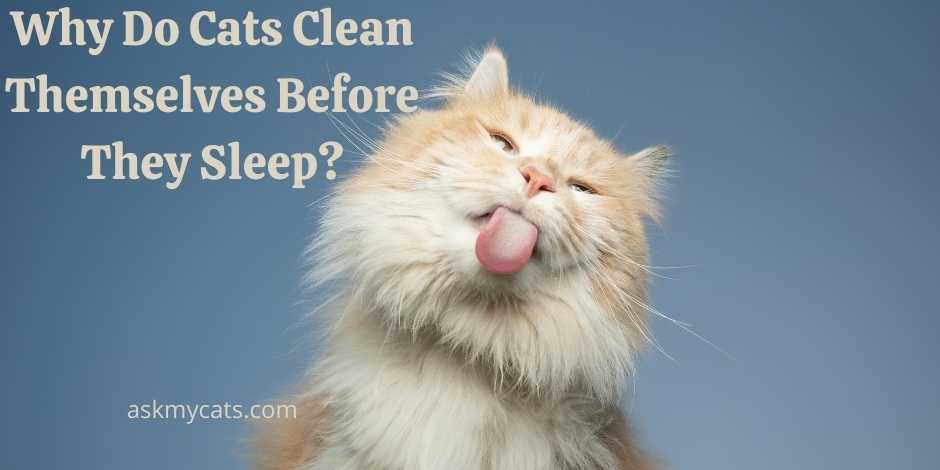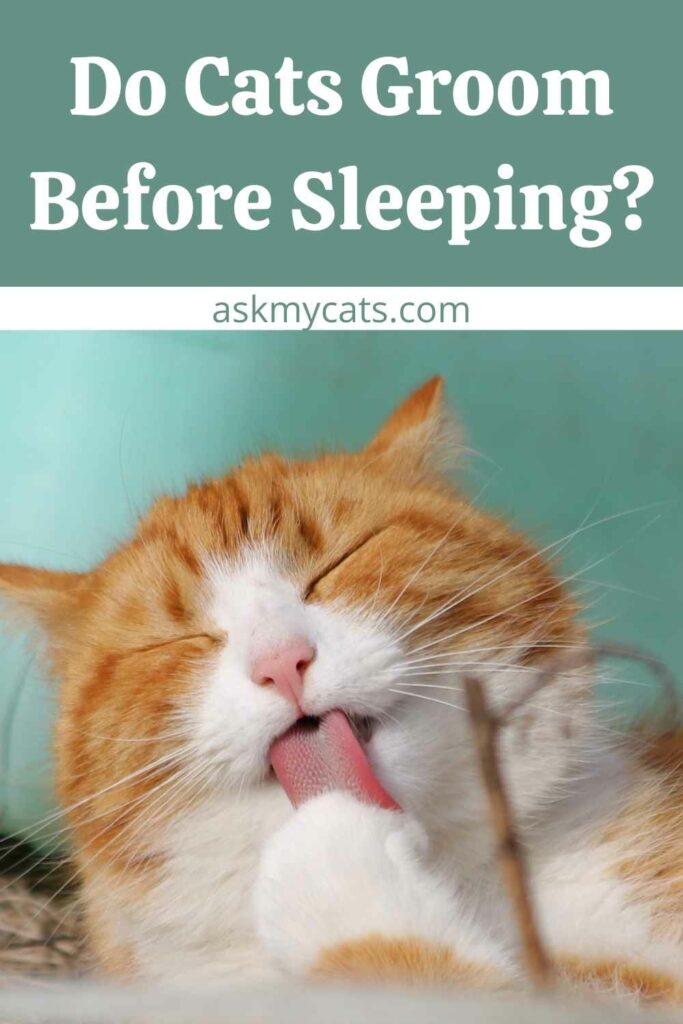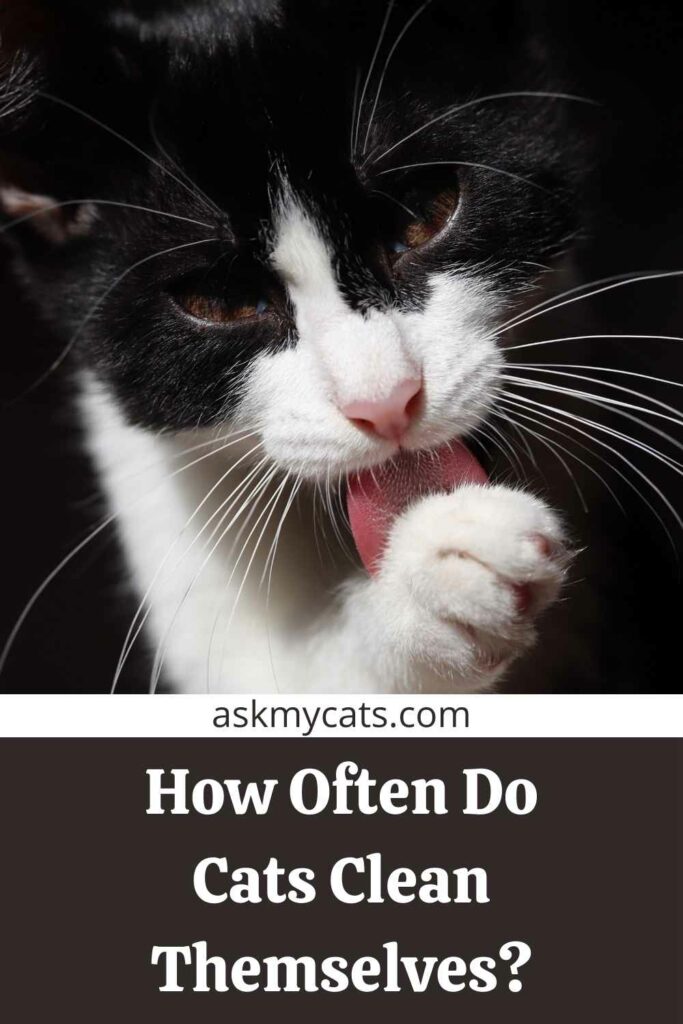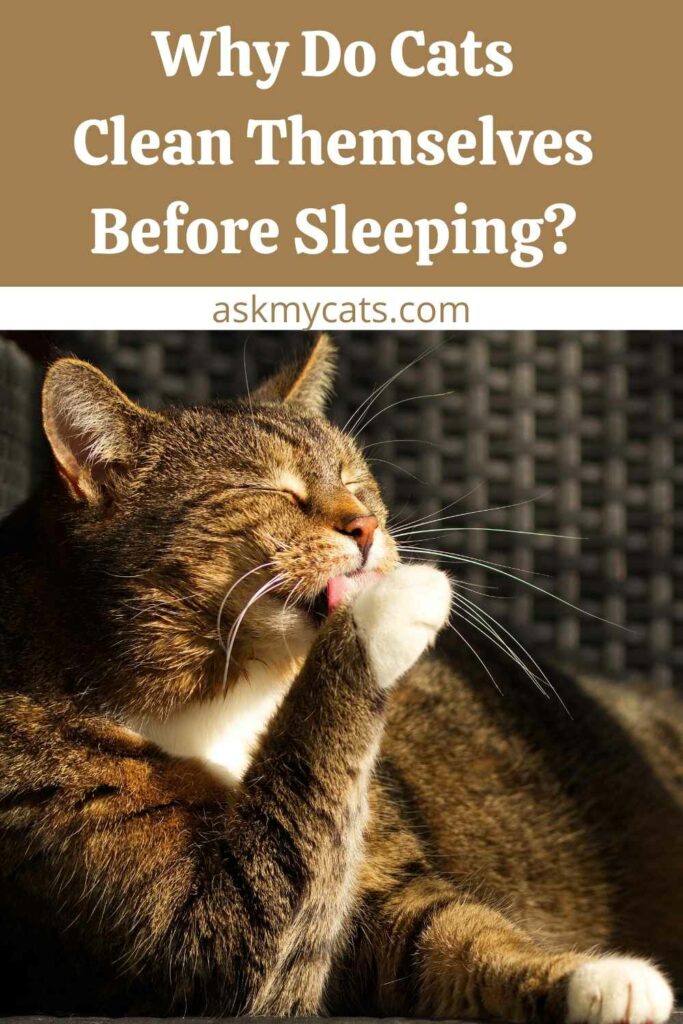Cats might be fanatical about keeping themselves tidy at times. This is part of their intricate grooming routine, which includes licking their fur and making sure everything is in good shape. It can also lead to the emergence of certain patterns over time.
Before going to sleep, cats clean themselves to eliminate any dirt or debris that has accumulated during the day. Most cats prefer to keep themselves clean, and doing so before going to bed guarantees that they have a good night’s sleep without feeling unclean.
Some people would just clean themselves throughout the day, while others will follow stringent grooming rituals immediately before night.


Give Your Cat the Perfect Day
Get the Free Ebook!
Do Cats Groom Before Sleeping?
Yes, cats groom before they go to sleep.

Kittens value grooming almost as much as they do for napping. Grooming can consume up to half of a cat’s waking hours.
Given that the average cat sleeps 15 hours a day, this indicates that many of them spend 4 to 5 hours licking a portion of their body.
With so much time spent grooming, you’re certain to observe some unusual licking habits, such as biting or gnawing.
Biting is a natural component of the grooming process. Cats nibble at their claws to remove shedding or damaged nails, and while this may appear weird, it is very natural.
When we witness a cat washing its paws, we may notice it chewing on its nails or the area surrounding its paw pads to remove dirt, litter, or other debris.
In the eyes of cats, cleanliness is second only to godliness. And the majority of cat owners agree. Grooming and licking himself till his hair is silky and shining is a delightful part of your cat. We all appreciate a well-kept pet.
According to recent research, farm cats spend roughly 15% of their time grooming. Depending on their activity level, the sort of food they eat, and their overall health, this figure might be greater or lower for companion cats.
The most common kind of grooming we encounter is regular maintenance grooming. To remove dirt and debris from their coats, cats lick them. This is frequently done before or after a meal, or before or after sleep or relaxation, similar to our peaceful morning bath or wake-up shower.
This style of grooming entails a regular rhythm of self-licking. Licking the coat actually function as a built-in thermostat in hot or cold conditions.
To keep warm or cold, your cat licks his hair. When it’s chilly outside, licking your cat’s fur smooths it out and traps the air, keeping him warm.
And, because cats have a restricted ability to sweat, their licking performs a comparable role to our sweating during the hot summer months. Saliva evaporates from wet fur, helping it to stay cool.
Check out what does it mean when a cat grooms itself in front of you
How Often Do Cats Clean Themselves?
Cats typically spend between 30 and 50 percent of their day grooming themselves.

Your cat stimulates glands at the base of the hairs to create a fluid that helps keep his coat wet when he licks and tugs at it.
Despite the fact that your cat adores being caressed, you may notice that he grooms himself right thereafter. This is to get rid of your aroma and balance. It also restores the smoothness of his coat to the way he prefers it.
The most prevalent kind of displacement activity in cats is grooming. It appears to alleviate stress in cats by reducing their alertness level.
If your cat is threatened by another household animal, for example, you may observe that he grooms himself casually for many minutes during an interaction.
Cats are known for their fastidious grooming, and an untidy coat is typically an indication of disease. Excessive grooming might sometimes be a sign of a problem (either medical or behavioral).
Excessive self-licking might result in baldness or stubbly, irritated regions. It is critical that you see your veterinarian in these situations.
Your cat will take care of himself in terms of grooming. You may, however, assist him, especially if he is a longhaired breed. Brush him every day to avoid uncomfortable matting, and you may even bathe him once in a while.
This will not only offer an extra boost of cleanliness, but it will also let you to spend quality time with your pet while also assisting with the reduction of nagging hairballs.
You might also like to know about why does my cat clean herself after i pet her
Why Do Cats Clean Themselves Before Sleeping?
The major reason for this is that many cats desire to keep their resting space clean.

They won’t want to sleep in a mound of mud, so make sure the environment is as clean as possible. This isn’t always possible in the wild, but they prefer to do so when they have the opportunity.
When it comes to their beds, pet cats frequently do this. Before resting down on the cat bed, cats will try to groom themselves and make sure their hair is as clean as possible.
They will be groomed by their mother as they grow up, and this is something that will be passed on to them in the future. It’s a part of who they are, and it’ll always be important when it comes to developing certain behaviors over time.
If they like being groomed before going to bed, they will do so on their own. Some cats have been reported to keep certain behaviors from a young age, such as grooming themselves before going to sleep when their mother used to do it.
Cats have a habit of repeating certain patterns in practically everything they do.
This includes what they eat, how they play, and, of course, what they do right before bedtime.
This will be determined by the location of the animal. Let’s imagine a cat lives in a filthy environment where dust is blowing around. In this circumstance, the cat will groom itself on a frequent basis, including before going to bed.
A cat that lives indoors in a tidy house, on the other hand, will clean itself at certain times. This includes doing it before going to bed or first thing in the morning.
Cats who spend a lot of time in dusty or dirty conditions may groom themselves several times during the day and night, including before resting.
The cat, especially as a pet, will follow predictable patterns and react to its surroundings. This includes the location where it rests.
Also, find out why do cats clean themselves after they eat
Are Cats Relaxed When They Clean Themselves?
Grooming acts as a soothing process (kitty massage).
Self-grooming as a displacement habit, according to animal behaviorists, helps the cat deal with conflict.
Cats spend a lot of their waking time licking themselves, in addition to pouncing, purring, and harassing their humans for rewards. Scientists have now discovered how sharp, tiny cones on cats’ tongues clean their fur and skin thoroughly rather than simply spreading spit around.
Stress-related alopecia is known as psychogenic alopecia. It’s an obsessive-compulsive disorder in which cats find themselves licking or gnawing on themselves.
Because grooming generates endorphins (happy hormones), cats will frequently engage in this delightful and soothing routine to help them relax.
You might also like to read about how do cats clean themselves after pooping
Frequently Asked Questions
Why Do Cats Clean Themselves In Front Of You?
To show affection and comfort, cats clean themselves in front of you. It demonstrates that they are willing to concentrate on grooming themselves in your company rather than becoming defensive. Many cats may approach you from time to time to groom your hair or skin.
Do Cats Really Get Clean When They Lick Themselves?
Cats can, in fact, use their sharp teeth and tongue to pick away trapped debris. This guarantees that surface-level dirt that settles into their fur is removed.
Why does my cat lick me before sleeping?
Cats licking our faces as we sleep is a common occurrence and a symbol of affection and trust. If your cat is excessively grooming itself, it might be an indication of psychogenic alopecia, which occurs when a cat over-licks in response to fear or stress.
Final Words
Cats acquire habits at a young age, and one of them is grooming themselves in front of you. Cats groom themselves in order to maintain their resting areas as clean as possible.
Drop your questions in the comments section below.
